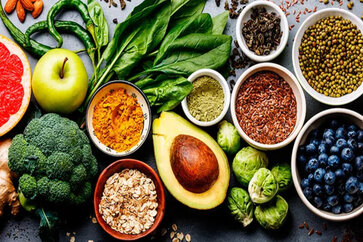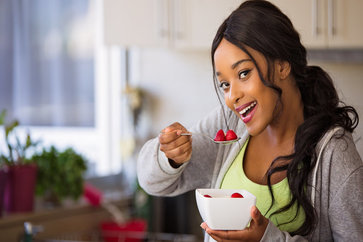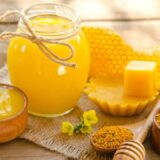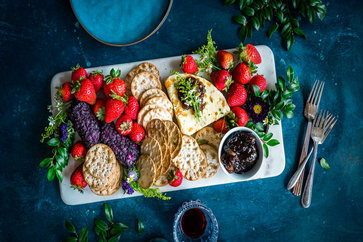Top 9 Healthy Foods To Eat While Pregnant
During pregnancy, it should be taken into account that meals should provide reinforcements of folic acid , vitamins C and B12, omega 3, all in a balanced way, and avoiding excesses of saturated fats and sugars.
Normally you need to gain between a kilo and a kilo and a half per month since the formation of the fetus will cause more calories to be consumed. In this weight gain, they must maintain the proportions between the different foods: carbohydrates, proteins, vitamins, etc.
Pregnancy superfoods
Pregnant women have special nutritional needs. With these foods, you will ensure that you get everything you need for yourself and your baby.
1. Avocado
Avocado is an unusual one because it contains a large amount of monounsaturated fatty acids, the healthy fat of the same type as olive oil. They also contain fiber, folic acid, vitamin K, potassium, copper, vitamin C, and vitamin E. Few foods can boast of a combination of nutrients so appreciated, especially by pregnant women.
Healthy fats not only provide energy but are essential for developing the skin, brain, and tissues of the fetus. Potassium prevents leg cramps, a symptom that accompanies many pregnant women.
2. Sesame
Iron is an essential mineral that is part of hemoglobin that carries oxygen. Since pregnant women have increased blood volume, they need more iron, especially during the third trimester. Low iron levels during the first half of pregnancy can cause anemia, which carries a risk of preterm labor and low birth weight.
Sesame is an excellent source of iron. It is advisable to consume it in the form of pasta (tahini), as it is thus more digestive. You can spread it on bread as if it were a pate, mix it with the chickpea hummus, turn it into a sauce by diluting it,
To improve the assimilation of the mineral, it is advisable to take a portion of food rich in vitamin C such as orange or red peppers at the same meal.
3. Sweet potato
Sweet potatoes are very rich in beta-carotene, an antioxidant pigment that transforms into vitamin A as the body needs it. This vitamin is essential for the growth and differentiation of most cells and tissues. It is, therefore, very important for healthy fetal development.
A 150 g serving provides all the vitamin A you need. It also contains fiber, which fights constipation and keeps blood sugar under control. Other foods rich in beta-carotene are mangoes, dried apricots, and pumpkin.
4. Quinoa
Quinoa is a pseudocereal (not botanically) very rich in quality protein. Proteins are necessary for the construction of new tissues and organs during pregnancy. A plate with 200 g of cooked quinoa provides 10 g of protein and good doses of B vitamins that support the nervous system and allow you to extract energy from food.
In addition to quinoa, pregnant women should eat whole grains because they are loaded with fiber, long-lasting energy, minerals such as selenium or magnesium, and B vitamins.
5. Soya yogurt
It contains many interesting nutrients for you. First of all, it is a source of proteins (around 4 g per 100 of product) that are needed to meet the needs of the growth of the fetus, the placenta, and maternal tissues.
Another soy product, tofu, can provide you with an extra protein. In addition, yogurt contains digestive bacteria that reduce the risk of complications such as pre-eclampsia, gestational diabetes, vaginal infections, and allergies.
It also provides you with choline, an essential nutrient that is classified among the B vitamins. It is necessary for the formation of the brain and neural tube.
6. Chickpea
Legumes are excellent sources of fiber, protein, iron, folate, and calcium. They are nutrients whose needs are especially needed in pregnant women. Chickpeas are highly recommended thanks to their composition: 200 grams of hummus provide 8 g of fiber, 10 g of protein, 3.2 mg of iron, 100 mg of calcium, and 120 mcg of folic acid, among many other minerals and vitamins.
If you are not used to consuming legumes on a daily basis, alternate whole chickpeas with the more digestive hummus, the chickpea paste that is quickly prepared in the blender with cooked chickpeas, olive oil, a little tahini (sesame paste), lemon juice and paprika (sprinkled on the surface). You can add cumin or coriander to it.
7. Flax oil
Most people, including pregnant women, don’t get enough omega-3s in their diet. These fatty acids are essential during pregnancy to build the neural tube, brain, and eyes of the fetus. Flax oil is one of the plant foods richest in alpha-linolenic acids, the “father” of the family of omega-3 fatty acids.
This food is essential in the diet of vegetarians, but it is also recommended for omnivorous pregnant women who must moderate their consumption of omega-3 sources such as tuna and salmon, due to their contamination with heavy metals such as mercury. Other highly recommended sources of omega-3s are walnuts and chia seeds.
8. Broccoli
Broccoli and other dark, green vegetables, like kale and spinach, contain many of the nutrients pregnant women need: fiber, vitamin C, vitamin K, vitamin A, and calcium Also, broccoli and green leafy vegetables are rich in antioxidant plant compounds, such as sulforaphane. High consumption of green leafy vegetables is associated with a reduced risk of being born lightweight.
9. Cucumber water
During pregnancy, the blood volume increases up to 1.5 liters. That is why pregnant women have an increased need for water. The symptoms of dehydration Mild include headaches, anxiety, fatigue, moodiness, and reduced memory.
Additionally, drinking water prevents constipation and reduces the risk of urinary tract infections. Both of these problems are common during pregnancy. General guidelines recommend drinking at least 2 liters of water a day, but in reality, the amount you need varies from person to person.
Keep in mind that this amount includes infusions and other drinks that you can drink, apart from water. A good idea is to always carry a bottle of water (better glass or steel than plastic) and take sips without waiting to feel very thirsty.
























Hi there, always I used to check blog posts here early in the break of day, because I love to gain knowledge of more and more.
You have brought up a very great details, thank you for the post
I blog quite often and I truly appreciate your content. Your article has really peaked my interest. I’m going to book mark your site and keep checking for new information about once a week.
I subscribed to your RSS feed as well.